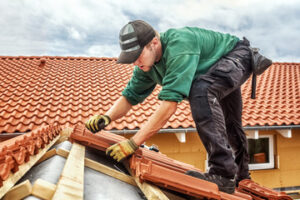The roof is one of the most essential parts of any home. It protects everything inside and adds curb appeal to the house.

The lifespan of your roof depends on the weather conditions where you live. For example, areas with lots of snow need a more durable roof. Contact Red Stick Roofing Of Louisiana for professional help.
Waterproofing roof membranes are an effective and affordable way to protect a home from moisture damage. They stop leaks and help avoid other problems, such as mold and mildew. These waterproofing products also increase the lifespan of the roof and reduce energy costs. Durable roof waterproofing also helps prevent damage to other parts of the structure, such as interior walls and ceilings.
Waterproof coatings are applied to a substrate or surface and are available in a range of finishes. Some can be painted and others are made from plastic or rubber, or a combination of both. They are typically a bituminous compound that is mixed with other chemicals to create a durable and weather resistant product. A good quality waterproof coating can last 20 to 40 years, depending on the installation process and the maintenance it receives.
Some of these materials are sprayable and come in different sizes, while others are preformed and need to be applied using a heating torch or a hot mop. The type of membrane used will depend on the environment, cost and the application. A bituminous coating is inexpensive and offers basic waterproofing protection. It can be applied to a flat or pitched roof and can also be used in conjunction with a vapor barrier.
When choosing a waterproofing membrane for your building, consider the elongation rate, which indicates how much the material can stretch. This is especially important when it comes to high-rise and steel buildings. The waterproofing should be able to accommodate the movement of the building, as well as cover cracks that develop in concrete over time.
Proper flashing is crucial for roof penetrations, transitions, and connections. A properly installed flashing system prevents moisture from entering the building, while allowing for expansion and contraction of the roofing material. Galvanized steel and aluminum are commonly used in flashing constructions because they resist corrosion.
To ensure the waterproofing membrane stays in good condition, you should clean it regularly. You should clean it one or two times a month, and remove any debris that has collected on the surface. You should also check for any moss or other growth that may indicate the need for repainting. It is also a good idea to keep the gutters and downspouts clear of any obstructions that can restrict water flow.
Fireproof
The threat of wildfire is becoming a major concern in many areas of the country, especially along the West Coast. Fortunately, there are some steps homeowners can take to protect their property from this risk. For example, investing in fireproof roof installation is an excellent way to reduce the damage that can be caused by wildfires. Choosing the right roofing materials is another important step to consider. This includes choosing fire resistant roofing, like CeDUR’s highly durable synthetic roof shakes.
The best choice for a fireproof roof is one that has received a Class A rating. This means that the material has passed rigorous tests to ensure that it can withstand flame penetration and other factors, including resistance to surface flame spread. There is no such thing as a completely fireproof roof, but these products can provide some protection in high-risk fire zones.
Class A roofing materials are designed to prevent the passage of flames and heat from one part of the building to another, and to keep the building safe from structural damage. These materials have proven their effectiveness through extensive fire testing and are highly effective at protecting the structure.
There are several options for a fireproof roof, including metal and tile. While the latter are a good choice, they can be costly and require specialized knowledge to install properly. For a more affordable option, you can also choose concrete or clay tiles. These are a good choice for a natural look, and they have a natural flame-resistance.
Choosing the right insulation is also essential for a fireproof roof. Make sure that the insulation is not placed too close to the HVAC vents, and that it does not cover electrical wires or boxes. These issues can cause the insulation to overheat and ignite. This can create an even greater danger for the roof, which is why it’s a good idea to hire a professional to ensure that the insulation is installed correctly.
Fireproof roofs are an excellent choice for homes in a fire-prone area, and they can help to keep the family safe from the dangers of wildfires. However, it’s important to remember that these roofs can only be as effective as the other components of the home. For this reason, homeowners should invest in other fire prevention measures, such as installing a fire-retardant spray or coating on the interior of their home.
Durable
Durable roof installation involves using the right materials to protect a home from the elements. These durable roofing materials include metal, tile, terracotta, and concrete. They are also energy-efficient and help to regulate indoor temperatures, saving homeowners money on utility bills. However, these roofing materials still require regular maintenance and upkeep to ensure that they last as long as possible. Choosing a contractor with a good reputation and extensive experience is vital to ensuring that the work is completed properly.
In addition, the right roofing material should meet local building codes and be installed in accordance with the manufacturer’s instructions. Choosing the best roofing materials for your home will not only provide protection from the elements but also add to its value. It will also save you the cost of repairing and replacing your roof in the future.
Easily Available
While price is important, it’s not the only factor to consider when choosing a roof installation service. You want to find a contractor with the experience, knowledge and expertise needed to do the job right. You also want to make sure that they use quality materials and follow proper installation techniques. It’s not worth it to go with the cheapest option if it ends up costing you more in repairs, replacements or energy bills down the line.
